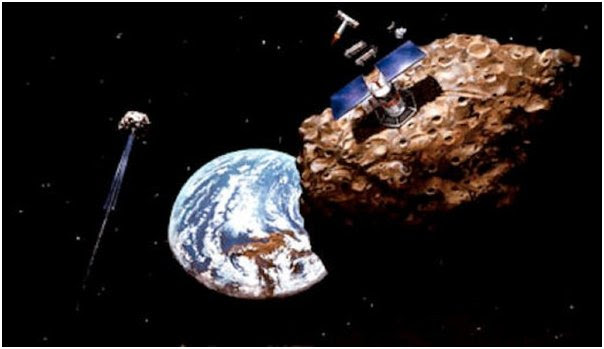President Obama signed the U.S. Commercial Space Launch Competitiveness Act (H.R. 2262) into law on Wednesday which grants proprietary rights to companies that endeavor to mine asteroids in outer space.
“This is the single greatest recognition of property rights in history,” said Eric Anderson, Co-Founder and Co-Chairman, Planetary Resources, Inc., an asteroid mining company that deployed a test demonstration spacecraft from the International Space Station this past summer. “This legislation establishes the same supportive framework that created the great economies of history, and will encourage the sustained development of space.”
Although harvesting rare metals are a long term goal of asteroid mining, water extraction is a near-term goal for asteroid mining because it is costly to launch water from Earth into outer space. In addition to human consumption, water found in space can also be converted into rocket fuel without expending the resources to launch the fuel from Earth.
Conflict With International Law
Although the law was enacted to clarify that resources mined from an asteroid or other celestial objects are the property of the U.S. entity that obtained them, the law appears to be in direct conflict with the Outer Space Treaty which was approved by the United Nation General Assembly in 1966 and signed by the United States and Russia in 1967. The international law states, in relevant part, that:
- the exploration and use of outer space shall be carried out for the benefit and in the interests of all countries and shall be the province of all mankind;
- outer space shall be free for exploration and use by all States;
- outer space is not subject to national appropriation by claim of sovereignty, by means of use or occupation, or by any other means;
- States shall be responsible for national space activities whether carried out by governmental or non-governmental entities; and
- States shall avoid harmful contamination of space and celestial bodies.
Foreign law professors condemn space mining provisions of commercial space act
The Commercial Space Launch Act, which includes provisions allowing American companies the right to keep resources that they mine in space, was recently signed into law by President Barack Obama. While the act has been hailed as groundbreaking in the United States, the space mining title has gotten an angry reaction overseas,

Oduntan’s environmental argument is expressed thus:
“So what’s at stake? We can assume that the list of states that have access to outer space - currently a dozen or so - will grow. These states may also shortly respond with mining programmes of their own. That means that the pristine conditions of the cradle of nature from which our own Earth was born may become irrevocably altered forever - making it harder to trace how we came into being. Similarly, if we started contaminating celestial bodies with microbes from Earth, it could ruin our chances of ever finding alien life there.
“Mining minerals in space could also damage the environment around Earth and eventually lead to conflict over resources. Indeed what right has the second highest polluter of Earth’s environment got to proceed with some of the same corporations in a bid to plunder outer space?”
Leaving aside the anti-American, anti-capitalist swipe, Oduntan’s argument could be applied to forbid even the peaceful exploration of space, lest space probes and astronauts “contaminate” the “pristine’ nature of space.
Oduntan attempts to claim that the notorious Moon Treaty, of which the United States is not a party to, is still binding as “customary law,” an odd position to take that suggest that the parties to an agreement can force their views on those countries that have chosen not to be parties by fiat.
Right now, the argument is academic, to be waged in law journals and op-ed pages. But the moment that a company like Planetary Resources or Moon Express start to conduct mining operations look for the matter to become a subject of the courts and international politics. The lawsuits will fly, and diplomatic pressure will be exerted as countries that do not have mining programs try to stop those that do have them or, failing that, put their hands out for their “fair share” of resources from the “province of mankind.”

